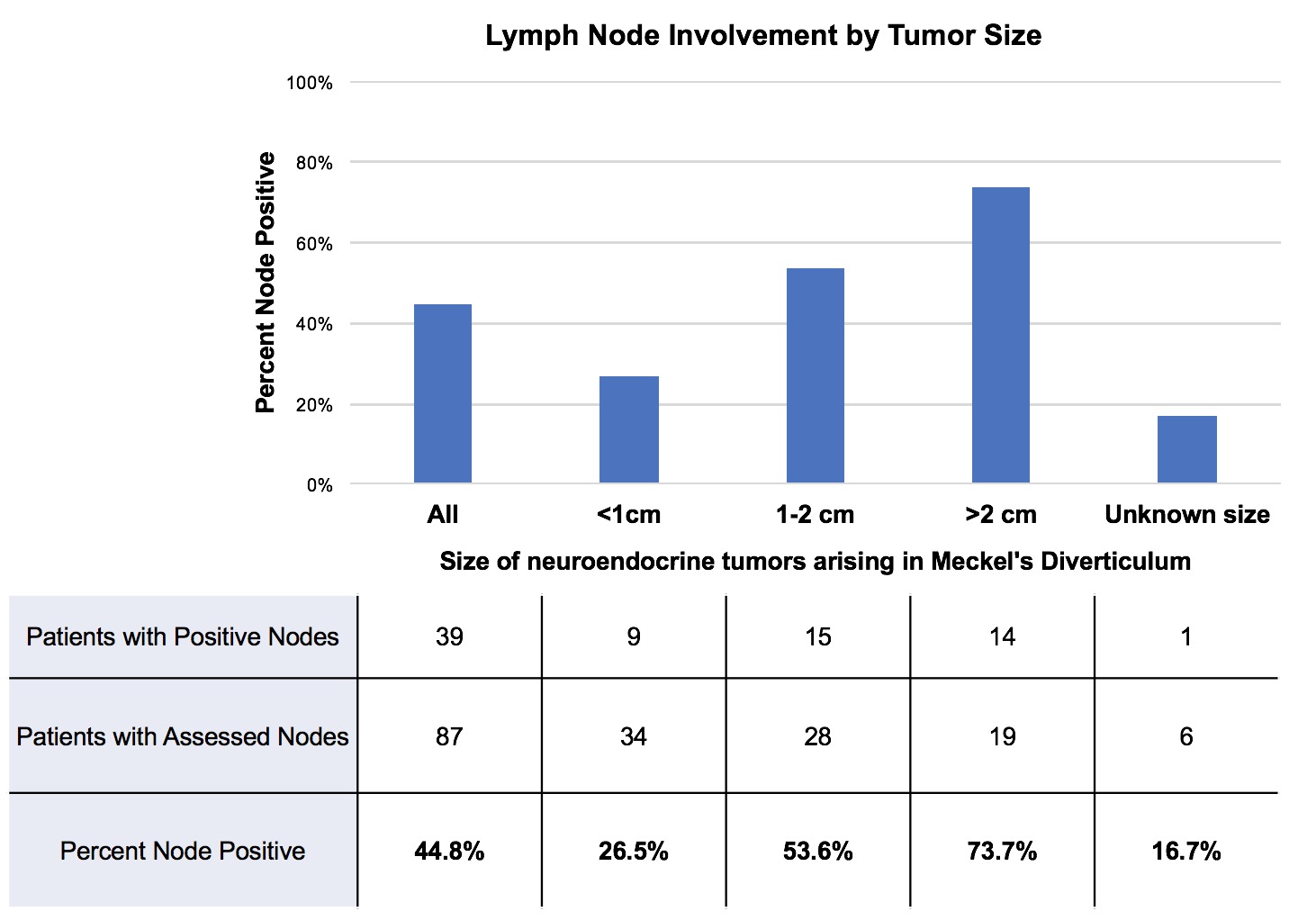|
Back to 2018 Posters
LYMPH NODE INVOLVEMENT IS COMMON FOR NEUROENDOCRINE TUMORS ARISING IN MECKEL's DIVERTICULUM: A RECOMMENDATION FOR LYMPHADENECTOMY REGARDLESS OF TUMOR SIZE BASED ON THE NCDB EXPERIENCE
Epameinondas Dogeas*, Matthew Porembka, Sam Wang, Adam Yopp, Patricio M. Polanco, John Mansour, Rebecca M. Minter, Michael A. Choti, Mathew M. Augustine
Surgery, University of Texas Southwestern Medical Center, Dallas, TX
Background: Several types of tumors may arise in a Meckel's diverticulum (MD), an anomaly of the small intestine. Amongst them, neuroendocrine tumors (NET) are the most prevalent. However, their metastatic potential and optimal surgical therapy remain ill-defined.
Methods: In a retrospective analysis of the National Cancer Database (2004-2015) patients with a diagnosis of MD malignancy were identified. Clinicopathologic factors were extracted and tumors arising in MD were compared. In the subgroup of patients with NET, the association between tumor factors and nodal involvement was investigated.
Results: 320 primary MD malignancies were captured in the NCDB, consisting of 280 (87.5%) NET, 22 (6.9%) adenocarcinomas and 18 (5.6%) GIST. The median age at diagnosis was 64 years. Patients were predominantly male (229, 70%) and Caucasian (310, 96%). NETs tended to be smaller (median size: 0.7 vs 3.5 vs 6.5 cm, p<0.001) and more frequently well-differentiated (42.1% vs 9.1% vs 22.2%, p<0.001) as compared to adenocarcinomas and GIST. Surgical resection of the primary tumor was performed in >99% of patients in all three malignancy groups. Regional node involvement (53.8% vs 44.8%% vs 0%, p=0.019), distal metastasis (40% vs 5.9% vs 11.1%, p<0.001) and worse overall survival (3-year OS: 22% vs 42% vs 56%, p<0.001) were associated with a diagnosis of adenocarcinoma as compared to NET and GIST.
Data for lymph node status was available for 87 NET patients. NET median tumor size was 1cm and 92% were well-differentiated tumors. 44.8% of NETs that arise in MD presented with nodal involvement. Although the risk of nodal metastasis increased with size (p<0.001), tumors <1cm also harbored nodal disease (9 out of 34, 26.5%). (Figure) No other tumor factors were associated with nodal metastasis, including tumor grade and lymphovascular invasion (p=0.156 and p=0.115). Regional node involvement was associated with the presence of distant metastasis (p<0.001). NET patients displayed a 3-year OS of 55%, which was impacted by advanced patient age (HR=1.1, p<0.001) and poor-tumor differentiation (HR=18.8, p=0.01), but not nodal positivity (p=0.053).
Conclusion: In this national cohort, neuroendocrine tumors were the most common malignancy arising in Meckel's diverticulum, followed by adenocarcinoma and GIST. Lymph node involvement was present irrespective of the size and grade of the NET in the Meckel's Diverticulum. Therefore, lymphadenectomy should be considered in the surgical management of patients with these uncommon neoplasms, regardless of tumor size.

Back to 2018 Posters
|

